Key takeaways:
- Cooking anxiety often arises from fear of failure and past experiences, impacting confidence and enjoyment in the kitchen.
- Strategies to alleviate anxiety include practicing mindfulness, setting manageable goals, and cooking with friends to foster a positive environment.
- Building confidence can be achieved through embracing mistakes, mastering basic recipes, and finding personal expression in cooking.
- Key lessons learned highlight the importance of patience, viewing cooking as a joyful process, and the transformative power of perseverance.
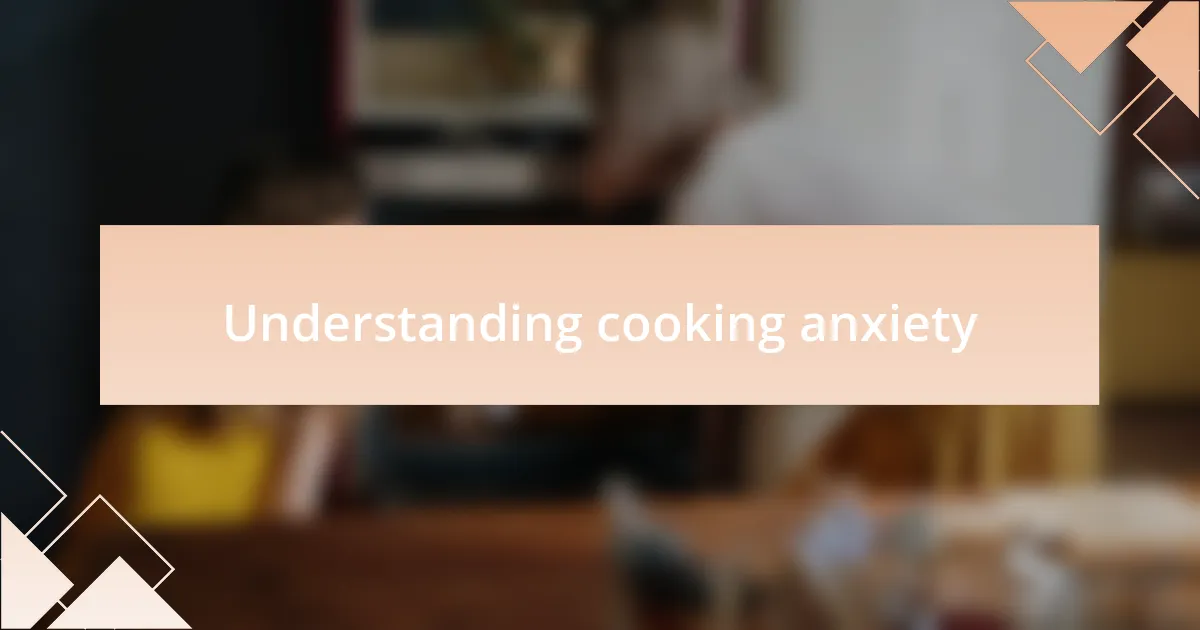
Understanding cooking anxiety
Cooking anxiety often stems from a fear of failure or not meeting personal expectations. I remember staring at a new recipe, my heart racing, convinced that my dish would turn out poorly. Have you ever felt the pressure of wanting to impress others, only to feel paralyzed by self-doubt?
The stakes can feel high in the kitchen, especially when we are preparing meals for family or friends. I vividly recall a time when I hosted a dinner party, worried that my roast chicken would end up undercooked or dry. What if everyone judged my skills based solely on that one meal? Such thoughts can be overwhelming, turning what should be a creative process into a source of stress.
It’s crucial to acknowledge that cooking anxiety is not uncommon. Many of us push through it, yet how often do we pause to understand the roots of these feelings? Identifying the triggers of our apprehension can be liberating, transforming a daunting task into a more enjoyable experience. By reflecting on our challenges, we can uncover the joy hidden beneath the anxiety.
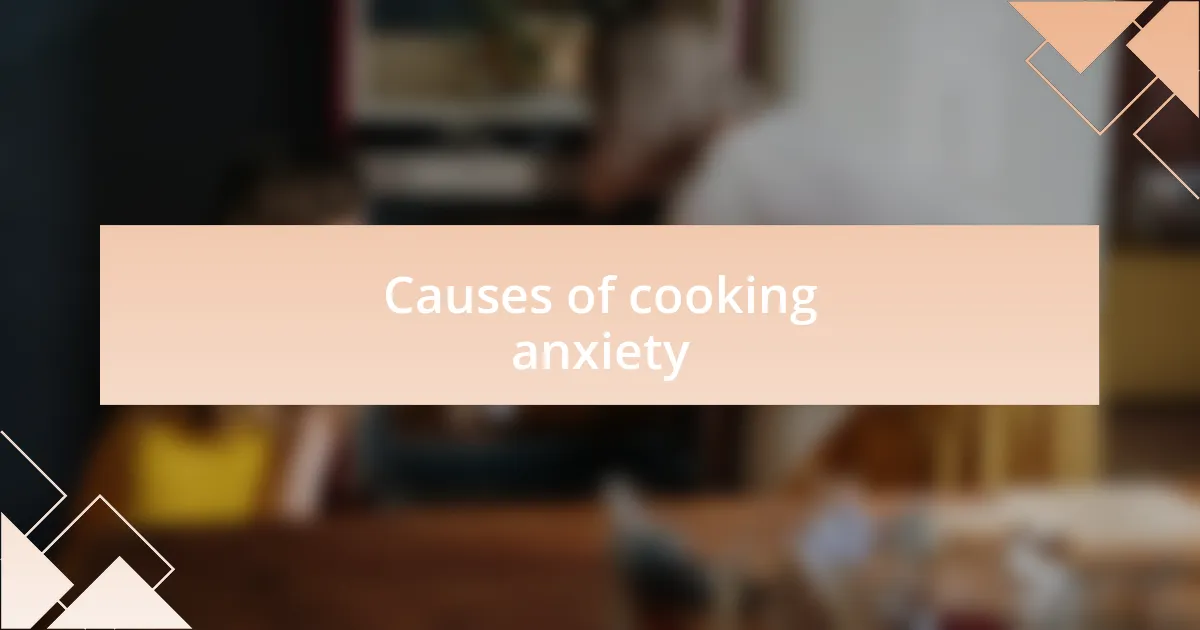
Causes of cooking anxiety
Cooking anxiety can often be traced back to childhood experiences. I remember standing on a stool beside my grandmother, nervously trying to mimic her every move. The fear of making mistakes loomed large in those moments; what if I ruined the recipe she had perfected over the years? This early pressure can plant seeds of doubt that persist into adulthood, making it hard to shake the feeling of inadequacy in the kitchen.
Another significant trigger is the overwhelming sea of online recipes and cooking shows. Have you ever felt lost while diving into a cooking video that showcased flawless techniques? I definitely have. Watching someone expertly whip up a dish in minutes can amplify my self-doubt. Instead of feeling inspired, I often end up feeling inadequate, which only feeds into my anxiety. The reality is, not everyone can create a gourmet meal in a flash, and that’s perfectly okay.
Moreover, social situations can heighten these feelings. When I’m asked to prepare a meal for a gathering, the pressure to impress can become paralyzing. I find myself worrying about how the food will be received and if it will match the expectations of guests. This fear of judgment can stifle creativity and transform cooking from a joyful experience into a chore fueled by anxiety. Can you relate?
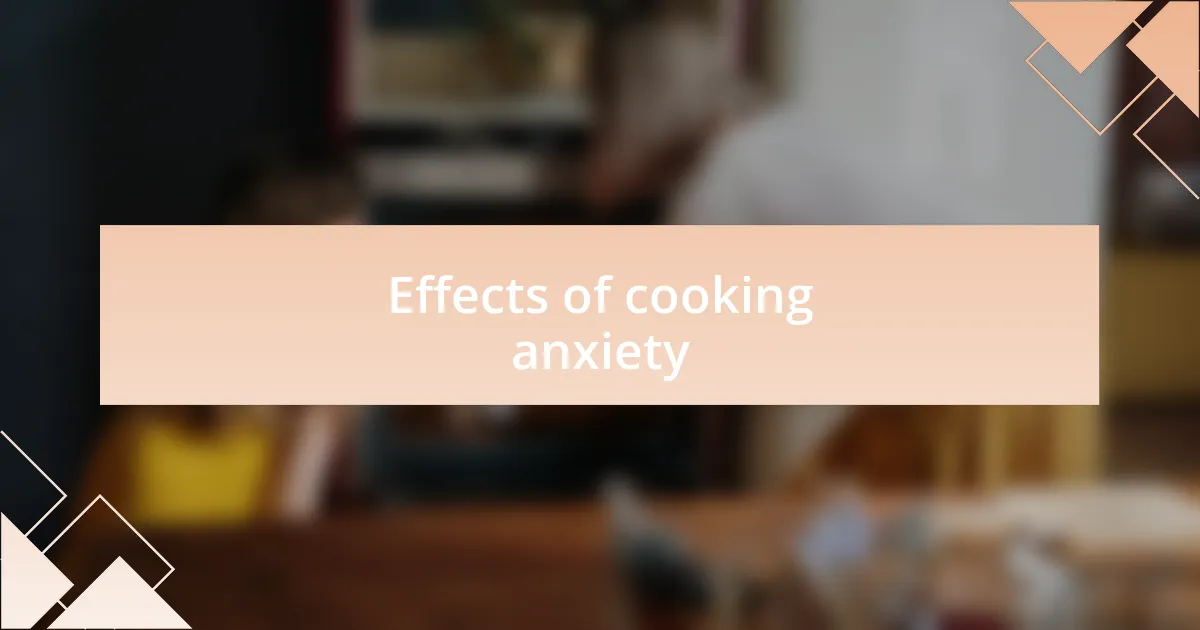
Effects of cooking anxiety
Cooking anxiety can have a profound impact on one’s enjoyment and confidence in the kitchen. I recall a time when the mere thought of preparing a meal left me feeling a tight knot in my stomach. I often caught myself second-guessing every ingredient and technique, and this self-doubt not only slowed me down but also dimmed the excitement that cooking once brought me. Have you ever felt that tension creeping in when you’re just about to start cooking?
In my experience, this anxiety can also manifest in avoidance. Instead of experimenting with new recipes or ingredients, I found myself gravitating towards the familiar. Sticking to the same few dishes felt safe, but it also stunted my growth as a cook. I would often wonder if I was missing out on something amazing, yet the fear of failure kept me locked in a cycle of predictability. Have you ever felt hesitant to try something new in the kitchen because of anxiety?
These feelings can cloud judgment and lead to a negative spiral. I remember one evening where I completely froze while attempting to follow a simple recipe. Instead of a delightful cooking experience, it became an overwhelming ordeal. The pressure to create a perfect dish almost paralyzed me, and I ended up ordering takeout. This kind of reaction not only affects how I view cooking but can also take a toll on my overall confidence. It’s crucial, I believe, to address these emotions and find ways to reclaim the joy of cooking.
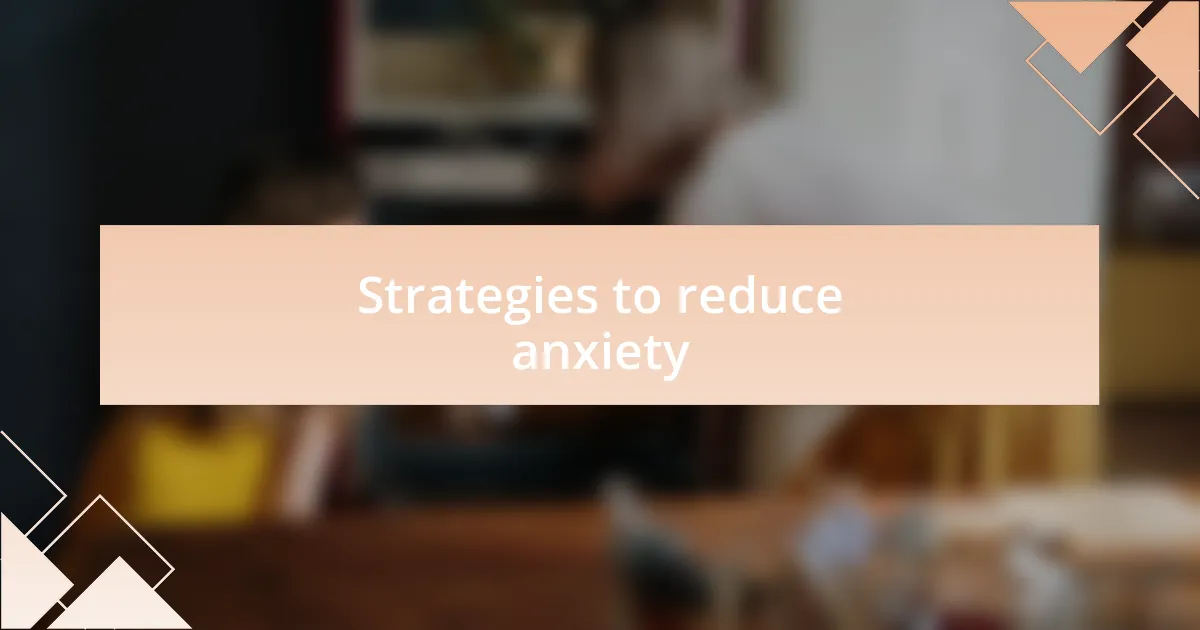
Strategies to reduce anxiety
One effective strategy I discovered was practicing mindfulness in the kitchen. Focusing on the ingredients—their colors, textures, and scents—helped ground me. Have you ever noticed how just taking a moment to breathe deeply can shift your mindset? I often remind myself to take a step back and appreciate the process, transforming anxiety into a meditative experience.
Another technique that worked wonders for me was setting smaller, achievable goals. Instead of tackling an elaborate meal all at once, I’d break it down into manageable tasks. For instance, I’d focus solely on chopping vegetables or mastering one simple dish each week. This approach not only made cooking less daunting but also boosted my confidence as I celebrated each accomplishment, however small. Isn’t it amazing how little victories can shift our perspective?
I also found that cooking with a friend alleviated much of my anxiety. Sharing the experience turned it into a fun and collaborative event rather than a stressful chore. I vividly remember an evening spent preparing dinner with a close friend, where laughter replaced my worries. It made me realize that cooking can be more about connection and joy than perfection. Have you tried inviting someone into your kitchen to share the journey?
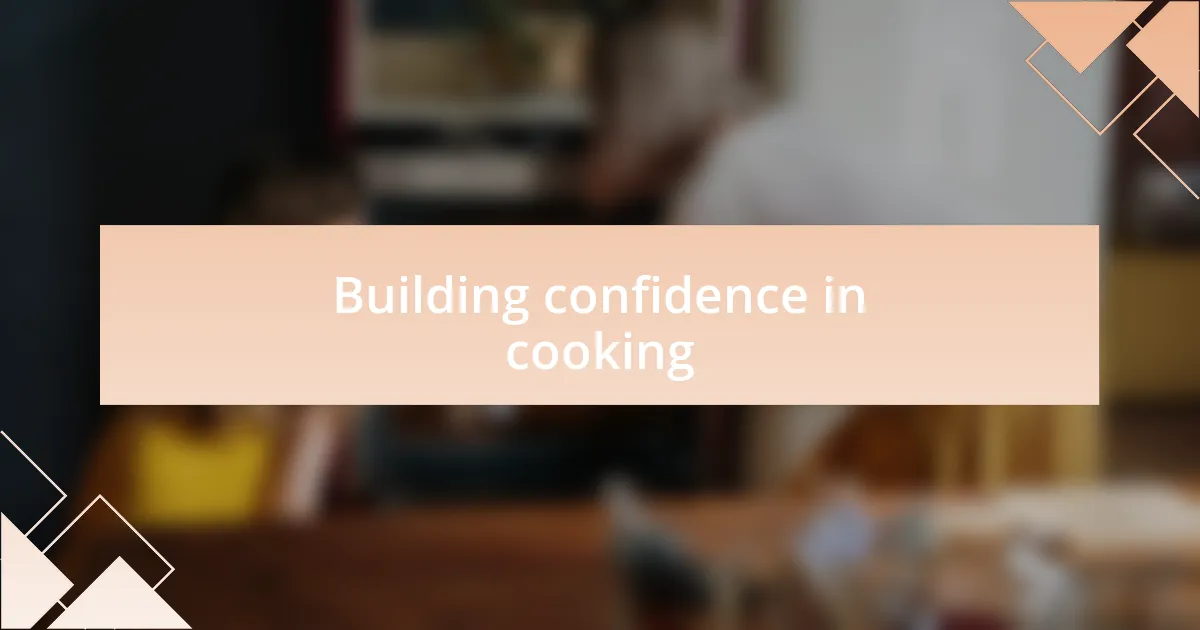
Building confidence in cooking
Building confidence in cooking often requires a shift in perspective. I recall when I first began experimenting with new recipes; the fear of failure loomed large. However, I learned that making mistakes could be the best teacher. Have you ever experienced the thrill of salvaging a seemingly ruined dish into something delicious? It’s a reminder that every cook has had their fair share of cooking disasters.
Another pivotal moment for me was discovering the importance of familiarity in the kitchen. Once I became proficient with a few staple recipes, I noticed my confidence blossomed. By mastering the basics—like a simple tomato sauce or scrambled eggs—I built a solid foundation. How liberating is it to know that one delicious dish can be your go-to when entertaining or simply cooking for yourself?
Lastly, I embraced the idea of self-expression through cooking. I started experimenting with flavors and ingredients that excited me, making the process feel more personal. Each ingredient I chose told a story, reflecting my tastes and preferences. So, have you ever thought about how your meals can become a canvas for your creativity? Finding joy in cooking rather than focusing solely on the end result truly transformed my experience in the kitchen.

My personal cooking journey
My cooking journey began somewhat timidly, as I tiptoed around the kitchen, apprehensive of what might sizzle or burn. One evening, while attempting to make my first risotto, I stood by the stove, anxiously stirring the pot, convinced that every mistake would lead to disaster. Yet, when I finally tasted that creamy, flavorful dish, a wave of triumph washed over me. Have you ever felt that rush of pride when something you created exceeds your expectations?
As I continued to experiment, there were moments of pure joy intertwined with frustration. I vividly remember the first time I baked a loaf of bread. The dough felt strange and foreign, and during the rising process, I found myself pacing around the kitchen, questioning if it would turn out at all. When I finally pulled a golden, crusty loaf from the oven, the smell enveloped my home, filling me with a sense of accomplishment. From that day on, I realized that food could be a source of comfort and solace.
Navigating my cooking skills was like discovering a new part of myself. Every recipe became an opportunity to explore my culinary identity. I often think back to family gatherings where I would shyly contribute a dish, feeling a blend of excitement and anxiety. Yet with each meal I shared, I gained confidence, realizing that my contributions were not just about the food but also about creating cherished moments with loved ones. Isn’t it amazing how cooking can weave connections between people?

Lessons learned from my experience
One significant lesson I learned is that mistakes are not the end of the world—they’re often the best part of the journey. I recall one evening, making a soup that turned out saltier than the ocean. Instead of despairing, I laughed it off, knowing I could either start anew or experiment by adding extra vegetables. Sometimes, those unexpected turns in a recipe lead to the most delightful surprises.
Another insight was embracing the rhythm of cooking as a dance rather than a chore. The first time I bonded with friends over a homemade pizza night felt like a revelation. We tossed flour, shared playful banter, and savored each step of the process. That night, I realized that cooking was not just about the finished dish, but about the laughter and joy that unfolded along the way. How often do we rush through moments without savoring the experience?
Finally, I’ve come to understand the value of patience and persistence. While learning how to sauté properly felt overwhelming at first, I stayed committed, gradually improving with each attempt. I remember savoring the breakthrough moment when my vegetables finally achieved that perfect caramelized texture. It reinforced my belief that growth comes with time and practice. Isn’t it incredible how perseverance can transform anxious cooks into confident chefs?